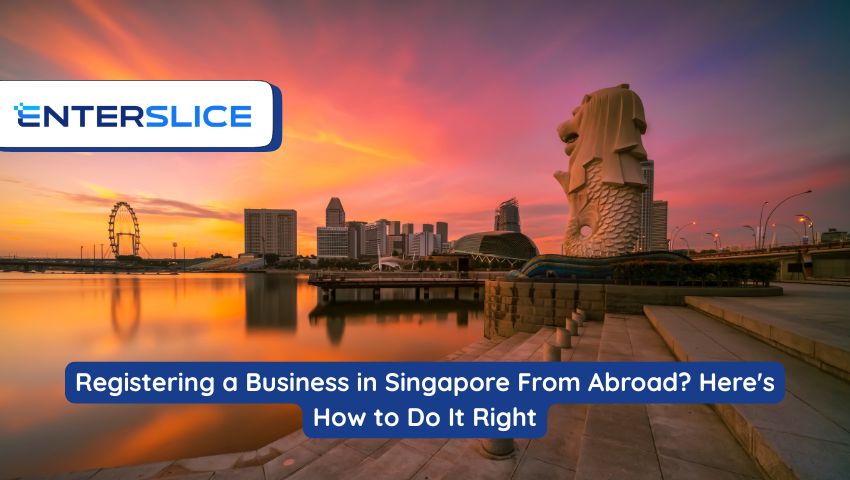Registering a Business in Singapore From Abroad? Here’s How to Do It Right

If you’re planning to expand or start your business internationally, Singapore is one of the most attractive locations in the world to do so. Thanks to its strong legal framework, low taxes, world-class infrastructure, and strategic location in Southeast Asia, company registration in Singapore has become increasingly popular with entrepreneurs, startups, and international investors alike.
But what if you’re not physically in Singapore? Can you still go through the Singapore company formation process from abroad? The answer is yes—and it’s more straightforward than you might think. In this guide, we’ll walk you through everything you need to know to successfully complete your Singapore company setup remotely.
Why Choose Singapore for Your Business?
Before diving into the how-to, it’s worth understanding why Singapore is a top choice for international business:
- It ranks consistently high for ease of doing business (World Bank)
- There is no capital gains tax
- Corporate tax rates are low (17% flat rate, with exemptions for startups)
- English is the official business language
- Strong intellectual property protections
- Strategic access to the Asia-Pacific region
For foreign entrepreneurs, these advantages make Singapore a gateway to Asia, especially if you’re looking to tap into ASEAN and global markets.
Can Foreigners Register a Company in Singapore?
Yes, foreigners can own 100% of a Singapore company. There are no citizenship or residency requirements for shareholders or directors, with one exception: you must appoint at least one local director who is either a Singapore citizen, permanent resident, or a holder of an Employment Pass or EntrePass.
Even though you can’t act as the sole director from overseas, there are solutions such as nominee directors and applying for work passes that make the process accessible.
Step-by-Step Guide to Registering a Business in Singapore From Abroad
Here’s a simplified breakdown of how to register your company in Singapore while you’re overseas.
1. Choose a Business Structure
The most common and recommended type for foreign-owned businesses is a Private Limited Company in Singapore. This structure offers limited liability protection, credibility, and tax benefits. Other structures like sole proprietorships or partnerships are not open to foreigners unless they reside in Singapore.
2. Select a Company Name
You’ll need to reserve your business name with the Accounting and Corporate Regulatory Authority (ACRA). The name must be:
- Unique and not too similar to existing entities
- Not infringing on trademarks
- Not obscene or prohibited by law
Name approval is typically quick—often within a day—unless it requires additional vetting from other authorities.
3. Appoint Directors and Shareholders
To comply with local regulations, your company must have:
- At least one local resident director in Singapore
- At least one shareholder (can be individual or corporate)
- A company secretary (must be appointed within six months of incorporation)
Many service providers in Singapore offer nominee director services to satisfy this requirement, particularly useful if you’re not moving to Singapore right away.
4. Prepare Required Documents
You’ll need to submit several documents for your Singapore company setup. These may include:
- A copy of your passport and proof of overseas address
- Details of company directors and shareholders
- Company Constitution (formerly known as Memorandum & Articles of Association)
- Description of business activities (up to 2 SSIC codes)
If your shareholder is a corporate entity, additional documents like a Certificate of Incorporation and a Board Resolution authorizing investment are required.
5. Engage a Registered Filing Agent
Foreigners cannot register a company directly with ACRA and must use a registered filing agent, such as a law firm or corporate services provider. They will handle the name reservation, document submission, and registration process for you.
They can also assist with additional services like:
- Providing a local registered address
- Acting as a nominee director
- Applying for relevant work passes
- Corporate bank account opening assistance
6. Register with ACRA
Once all documents are prepared and due diligence checks are complete, your company can be officially incorporated through ACRA. This usually takes less than 24 hours unless further vetting is needed.
Upon successful registration, you’ll receive:
- Certificate of Incorporation
- Business Profile (Bizfile) from ACRA
These documents are critical for bank account opening and contractual agreements.
7. Open a Corporate Bank Account
Most banks in Singapore require at least one director to be physically present for account opening. However, many banks offer remote onboarding or partner with corporate service firms to simplify this step for foreign entrepreneurs.
Popular banks for Singapore company formation include DBS, OCBC, UOB, and international banks like HSBC and Citibank.
Some fintech companies also offer digital business accounts that may not require a local visit.
8. Comply with Ongoing Requirements
Once your Singapore company is set up, ongoing compliance is crucial. These include:
- Filing of annual returns to ACRA
- Submitting financial statements and tax filings to IRAS
- Holding an Annual General Meeting (AGM)
- Maintaining proper bookkeeping and accounting records
If you’re working with a service provider, they can handle most of these for you.
Common Challenges Faced by Foreign Entrepreneurs
While the process is streamlined, some challenges may arise:
- Not being able to open a bank account remotely
- Understanding regulatory obligations
- Delays in verification or document approvals
- Finding a reliable nominee director or secretary
This is why working with an experienced Singapore company registration specialist can save time, money, and headaches.
Also Read: What are the Different Licensing options for Finance Company in Singapore
How Much Does It Cost?
The cost of setting up a company in Singapore from abroad varies depending on services used. On average:
- Incorporation packages: SGD 800 – SGD 2,500
- Nominee director services: SGD 2,000 – SGD 4,000/year
- Registered address and secretary: SGD 300 – SGD 800/year
Make sure to compare packages and look for transparent pricing and responsive support.
Can You Run the Business Remotely?
Yes, many international entrepreneurs run their Singapore companies without relocating. With digital communication tools, cloud accounting, and local representatives, it’s entirely feasible to manage everything from abroad.
However, if you plan to be hands-on, applying for an Employment Pass and moving to Singapore might be beneficial.
Frequently Asked Questions
1. Can I own 100% of a Singapore company as a foreigner?
Yes, Singapore allows full foreign ownership of a company. You do not need a local partner or shareholder.
2. Do I need to be in Singapore to register my company?
No, you can register your company remotely using a registered filing agent. You don’t need to be physically present in Singapore for incorporation, though some banks may require a visit for account opening.
3. How long does the company registration process take?
If all documents are in order, the registration process can be completed in as little as 1-2 days, especially with the help of a professional services firm.
This guide is designed to help foreign entrepreneurs confidently navigate the process of Singapore company formation from abroad. By choosing the right service partner and understanding the local regulations, your Singapore company setup can be both efficient and legally compliant—giving you a strong foundation in one of the world’s most business-friendly nations.



